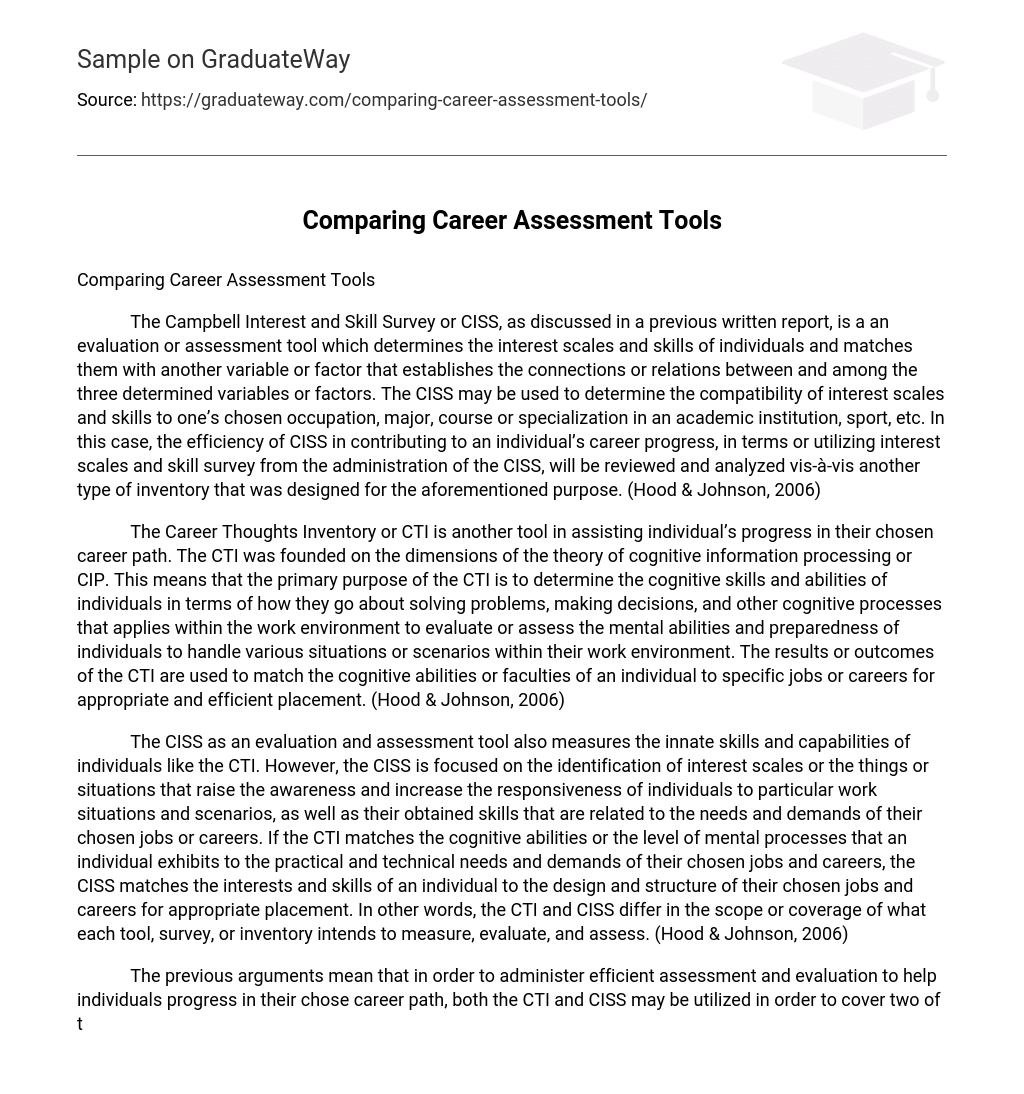The Campbell Interest and Skill Survey or CISS, as discussed in a previous written report, is a an evaluation or assessment tool which determines the interest scales and skills of individuals and matches them with another variable or factor that establishes the connections or relations between and among the three determined variables or factors. The CISS may be used to determine the compatibility of interest scales and skills to one’s chosen occupation, major, course or specialization in an academic institution, sport, etc. In this case, the efficiency of CISS in contributing to an individual’s career progress, in terms or utilizing interest scales and skill survey from the administration of the CISS, will be reviewed and analyzed vis-à-vis another type of inventory that was designed for the aforementioned purpose. (Hood & Johnson, 2006)
The Career Thoughts Inventory or CTI is another tool in assisting individual’s progress in their chosen career path. The CTI was founded on the dimensions of the theory of cognitive information processing or CIP. This means that the primary purpose of the CTI is to determine the cognitive skills and abilities of individuals in terms of how they go about solving problems, making decisions, and other cognitive processes that applies within the work environment to evaluate or assess the mental abilities and preparedness of individuals to handle various situations or scenarios within their work environment. The results or outcomes of the CTI are used to match the cognitive abilities or faculties of an individual to specific jobs or careers for appropriate and efficient placement. (Hood & Johnson, 2006)
The CISS as an evaluation and assessment tool also measures the innate skills and capabilities of individuals like the CTI. However, the CISS is focused on the identification of interest scales or the things or situations that raise the awareness and increase the responsiveness of individuals to particular work situations and scenarios, as well as their obtained skills that are related to the needs and demands of their chosen job or careers. If the CTI matches the cognitive abilities or the level of mental processes that an individual exhibits to the practical and technical needs and demands of their chosen jobs and careers, the CISS matches the interests and skills of an individual to the design and structure of their chosen jobs and careers for appropriate placement. In other words, the CTI and CISS differ in the scope or coverage of what each tool, survey, or inventory intends to measure, evaluate, and assess. (Hood & Johnson, 2006)
The previous arguments mean that in order to administer efficient assessment and evaluation to help individuals progress in their chose career path, both the CTI and CISS may be utilized in order to cover two of the most important factors that influence the ability of individuals to fulfill career roles and responsibilities – their cognitive or mental abilities and their practical skills and motivation manifested in their personal interests.
The aforementioned contrastive statements that discuss the major difference between the CTI and the CISS are backed up by the specific contents of the inventory and the survey respectively. The orientation scales utilized by the CISS to label the interests and skills of individuals consists of various roles and activities that represent job descriptions of numerous positions within the workplace such as influencing, organizing, helping, creating, analyzing, producing, and adventuring.
Each role or activity represents particular jobs that individuals are most likely interested to fulfill within the work setting. For instance, if the results of an individual’s CISS reveal he is most interested and skilled in organizing, he is more likely to fit under administration and management positions within organizations. The CISS looks into what individuals like or want to do and their ability to do them in order to determine the ideal jobs or positions that they are most likely to succeed in. (Bob, 2002)
The CTI on the other hand reflects on the rate or level of obtaining knowledge of individuals. The four domains utilized in the CTI to measure the cognitive abilities of individuals constitute four domains, namely self-knowledge, occupational knowledge, decision-making skills, and executive processing. (Sampson, et. al., 1999) In general, the CTI looks into what individuals are capable of doing within specific work situations, such as problem-solving, decision-making, etc., and determines the ideal jobs or positions that fit their cognitive abilities, whether they are interested in meeting the job description or not, as opposed to the CISS which looks into an individual’s interest scales and practical skills.
References
- Bob, B. (2002). Campbell Interest and Skill Survey. Retrieved January 15, 2009, from Pearson Assessments. Website: http://www.pearsonassessments.com/reports/ciss.htm
- Hood, A. B & Johnson, R. W. (2006). Assessment in Counseling, Fourth Ed. Alexandria, VA: American Counseling Association.
- Sampson, J. P., et. al. (1999). The Use and Development of the Career Thoughts Inventory. Retrieved January 15, 2009, from Florida State University. Website: http://www.career.fsu.edu/documents/career%20thoughts%20inventory/Use%20and%20Development%20of%20CTI.htm





